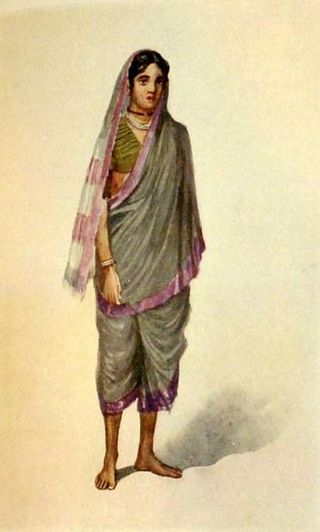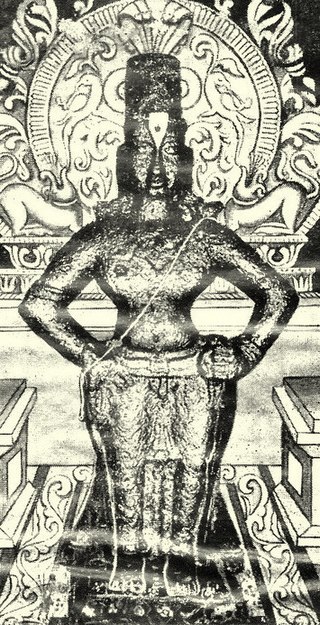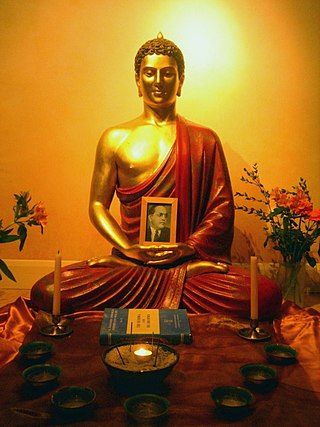Related Research Articles

Jyotirao Govindrao Phule, also known as Jyotiba Phule, was an Indian social activist, businessman, anti-caste social reformer and writer from Maharashtra.

Sant Tukaram Maharaj, also known as Tuka, Tukobaraya, Tukoba, was a Hindu, Marathi Saint of Varkari sampradaya" in Dehu village, Maharashtra in the 17th century. He was a bhakt of the god Vithoba of Pandharpur. He is best known for his devotional poetry called Abhanga, which are popular in Maharashtra, many of his poems deal with social reform.
Marathi literature is the body of literature of Marathi, an Indo-Aryan language spoken mainly in the Indian state of Maharashtra and written in the Devanagari and Modi script.

Dalit is a term used for untouchables and outcasts, who represented the lowest stratum of the castes in the Indian subcontinent. They are also called Harijans. Dalits were excluded from the fourfold varna of the caste hierarchy and were seen as forming a fifth varna, also known by the name of Panchama. Several scholars have drawn parallels between Dalits and the Burakumin of Japan, the Baekjeong of Korea and the peasant class of the medieval European feudal system.

Mahar is an Indian caste found largely in the state of Maharashtra and neighbouring areas. Most of the Mahar community followed B. R. Ambedkar in converting to Buddhist in the middle of the 20th century. As of 2017 the Mahar caste was designated as a Scheduled Caste in 16 Indian states.

Warkari is a sampradaya within the bhakti spiritual tradition of Hinduism, geographically associated with the Indian state of Maharashtra. Warkaris worship Vitthal, the presiding deity of Pandharpur, regarded as a form of Vishnu. Saints and gurus of the bhakti movement associated with the Warkaris include Dnyaneshwar, Namdev, Chokhamela, Eknath, and Tukaram all of whom are accorded the title of Sant. Recent research has suggested that the Varkaris were historically the followers of Krishna. Vittala is also another name for Krishna. Krishna is referenced as Vittala in most Bhakthi songs of Purandara Dasa and other Bhakti Saints.

Vithoba, also known as Vitthala, and Panduranga, is a Hindu deity predominantly worshipped in the Indian state of Maharashtra and Karnataka. He is a form of the Hindu deity Vishnu in his avatar: Krishna. Vithoba is often depicted as a dark young boy, standing arms akimbo on a brick, sometimes accompanied by his consort Rakhumai.

Chokhamela was a saint from Maharashtra, India in the 13th–14th century. He belonged to the Mahar caste, which was considered that time one of the low castes in India. He was born at Mehuna Raja, a village in Deulgaon Raja Taluka of Buldhana district. He lived at Mangalvedha in Maharashtra. He wrote many Abhangas. One of his known Abhangas is 'Abir Gulal Udhlit Rang". Social activist Arvind Prabhakar Kayande Started Celebrating "Chokhamela Festival" in Deulgaon Raja. He was one of the first low-caste poets in India.
Sant Janābāi was a Marāthi religious Sant and poet in the Hindu tradition in India, who was born likely in the seventh or the eighth decade of the 13th century. She died in 1350.

Navayāna, otherwise known as Navayāna Buddhism, refers to the socially engaged form of Buddhism founded and developed by the Indian jurist, social reformer, and scholar B. R. Ambedkar; it is otherwise called Neo-Buddhism and Ambedkarite Buddhism It is not any new sect, it is rather application of Buddhist principles for the welfare of many.

Kanhopatra was a 15th-century Marathi saint-poet, venerated by the Varkari sect of Hinduism.
Dalit literature is a genre of Indian writing that focuses on the lives, experiences, and struggles of the Dalit community over centuries, in relation to caste-based oppression and systemic discrimination. This literary genre encompasses various Indian languages such as Marathi, Bangla, Hindi, Kannada, Punjabi, Sindhi, Odia and Tamil and includes narrative-styles like poems, short stories, and autobiographies. The movement started gaining influence during the mid-twentieth-century in independent India and has since spread across various Indian languages.
Sant Karmamela was a 14th-century poet saint from Maharashtra. He was a son of Chokhamela and Soyarabai who belonged Mahar caste. In his Abhangs he accused God for forgetting and how his life was made miserable as a low caste. He rebelled against varna system.
Sant Banka In most of his abhangs he praised Vitthal in happiness and peace. Infrequently, he described his lower caste birth.
Soyarabai was a saint from the Mahar caste in 14th-century Maharashtra, India. She was a disciple of her husband, Chokhamela.
The Worli riots occurred in the chawl, or tenement, in the Worli neighborhood of Mumbai between January and April 1974. The riots began on 5 January 1974 after the police attempted to disperse a rally of the Dalit Panthers that had turned violent. Regular clashes between the Dalit Panthers, the Shiv Sena, and the police continued for several months. Six people were killed in the riots, and approximately 113 injured; widespread property damage also occurred in the tenements. The riots have been described as anti-Dalit violence by scholars.

Eleanor Zelliot was an American writer, professor of Carleton College and specialist on the India, Southeast Asia, Vietnam, women of Asia, Untouchables, and social movements.
Religion in Maharashtra is characterised by the diversity of religious beliefs and practices.

Marathi Buddhists are Buddhists of Marathi ethnic and linguistic identity. The religious community resides in the Indian state of Maharashtra. They speak Marathi as their mother-tongue. The Marathi Buddhist community is the largest Buddhist community in India. According to the 2011 Indian census, Marathi Buddhists constitute 5.81% of the population in Maharashtra, which is 77% of the total Buddhist population in India.
References
- ↑ Kher, B.G. (1979). "Maharashtra Women Saints". In Swami Ganananda; Steward-Wallace, John (eds.). Women Saints, East & West. Hollywood, Calif.: Vedanta. pp. 61–62. ISBN 0874810361.
- ↑ Zelliot, Eleanor (2000). "Sant Sahitya and its Effect on Dalit Movements". In Kosambi, Meera (ed.). Intersections: Socio-cultural Trends in Maharashtra. New Delhi: Orient Longman. p. 190. ISBN 8125018786.
- ↑ Ghokale-Turner, Jayashree B. (1981). "Bakhti or Vidroha: Continuity and Change in Dalit Sahitya". In Lele, Jayant (ed.). Tradition and modernity in Bhakti movements. Leiden: Brill. p. 29. ISBN 9004063706.
- ↑ Zelliot, Eleanor (2008). "Chokhamela, His Family and the Marathi Tradition". In Aktor, Mikael; Deliège, Robert (eds.). From Stigma to Assertion: Untouchability, Identity and Politics in Early and Modern India. Copenhagen: Museum Tusculanum Press. pp. 76–86. ISBN 978-8763507752.